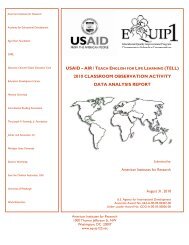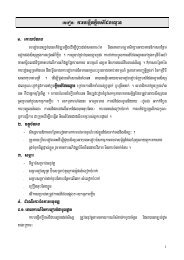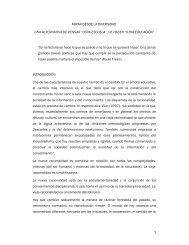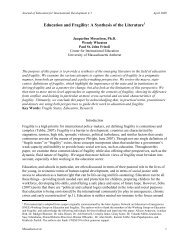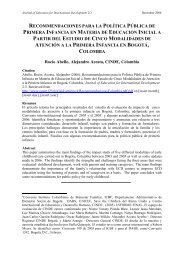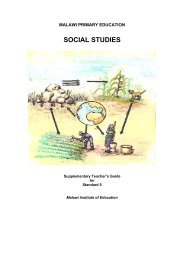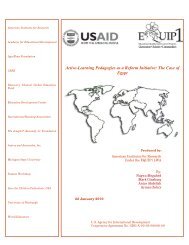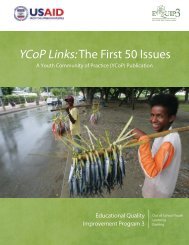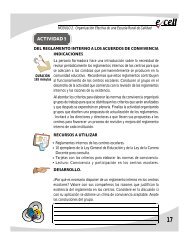The Power of Persistence: Education System ... - EQUIP123.net
The Power of Persistence: Education System ... - EQUIP123.net
The Power of Persistence: Education System ... - EQUIP123.net
Create successful ePaper yourself
Turn your PDF publications into a flip-book with our unique Google optimized e-Paper software.
In Namibia, triangulated information from school self-assessment, classroom<br />
observations, and student assessment informs teacher practice, pr<strong>of</strong>essional<br />
development planning, and policy. In Egypt, standards-based assessments<br />
<strong>of</strong> management practices and other aspects <strong>of</strong> schooling as well research<br />
findings on student learning, critical thinking, and problem-solving provide<br />
immediately relevant measures <strong>of</strong> both impact and issues in implementing the<br />
reforms. Increased use and confidence in EMIS systems in Zambia have helped<br />
policy makers recognize the impact <strong>of</strong> community school growth and have led<br />
to increased recognition and support <strong>of</strong> community schools.<br />
<strong>The</strong>se examples importantly highlight the fact that the use <strong>of</strong> information is<br />
really about enabling the system—and the people who work in or with it—to<br />
learn, adapt, and respond to the reality on the ground. Information that is used<br />
effectively in the context <strong>of</strong> a communications strategy can have a catalytic<br />
effect on system change as well as simply providing data.<br />
7. Sustainability <strong>of</strong> specific activities is less important than continuity and<br />
sustained system improvement.<br />
Sustainability <strong>of</strong> particular interventions, policies, or practices is one <strong>of</strong> the<br />
fundamental concepts <strong>of</strong> development. In the case <strong>of</strong> education, the concept<br />
may be problematic: sustainability is primarily a project concept rather than a<br />
systems concept. Sustainability is typically thought <strong>of</strong> as donor organizations<br />
passing to the government responsibility for financing and implementing<br />
project interventions.<br />
In place <strong>of</strong> such an inherently donor-centric approach, a systems perspective<br />
considers sustainability over the long term, during which education<br />
innovations and interventions may be usefully continued, modified, or dropped<br />
as the context changes, while commitment and focus on improving the quality<br />
<strong>of</strong> education remain constants.<br />
Establishment <strong>of</strong> a mature and effective education structure that can<br />
implement, evaluate, and adapt as needed is the foundation <strong>of</strong> genuine<br />
sustainability. This structural and institutional improvement is essential, and<br />
requires the incorporation <strong>of</strong> two other elements: continuity and survivability.<br />
Continuity <strong>of</strong> people, procedures, policies, and systems is important to<br />
sustained improvement in education quality. It is difficult for any organization<br />
to implement fundamental reforms with significant and frequent turnover at<br />
the leadership and technical levels. Of course, change in leadership, personal<br />
and political agendas, and even ideology is an inherent feature <strong>of</strong> democracy,<br />
SECTION 3: SUMMARY fINdINGS ANd CONClUSIONS<br />
143



